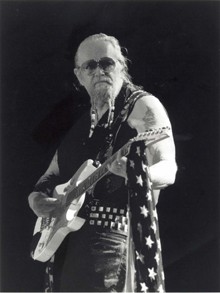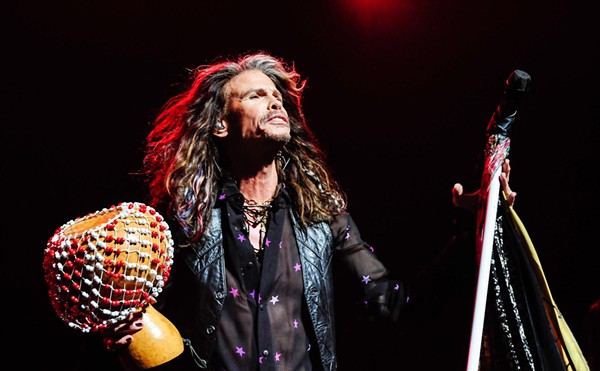David Allan Coe isn't yet ready to take his job and shove it
| David Allan Coe: the biker community's favorite country singer |
A few weeks ago, city officials in Portland, Maine canceled a David Allan Coe concert scheduled for June 16 because they feared that the show would attract so many feuding members of rival biker gangs that an all-out riot would ensue. Say this much for Coe: It's hard to think of another 65-year-old country crooner able to strike fear in the hearts of civic leaders and anarchy in the loins of leather-clad social outcasts.
Over the years, it's been common to insert Coe's name into the long list of so-called "outlaws" who reshaped country music in the '70s, a list inevitably fronted by Willie Nelson and Waylon Jennings. Truth be told, Nelson and his compatriots were not outlaws as much as mavericks, artists a little too idiosyncratic to flourish in the Nashville studio system. They weren't trying to start a revolution or threatening to ride a Harley chopper up your backside. They just wanted to find an audience that understood their work.
David Allan Coe was different. Calling him an outlaw didn't quite cut it: He was gangsta country, a sub-genre he invented and continues to monopolize three decades after the fact. He bragged about spitting, cursing, fighting, and raising hell. He was to C&W what DMX would later be to hip-hop, an angry ex-con who built a career out of mythologizing his own bad-ass, hair-trigger disposition. It's no wonder that Coe shows an affection for hip-hop, and even performs a snippet of Eminem's "Slim Shady" at his shows. What is "I'd Like to Kick the Shit Out of You," after all, but NWA with a twang? What is "I Made Linda Lovelace Gag" but 2 Live Crew, from the perspective of a weather-beaten '70s redneck? Coe conveys so much crazy-eyed nastiness that if he and Charles Manson both showed up at your door on the same day in 1969, you would have been more inclined to invite in Manson.
Coe spent much of his youth behind bars for a series of offenses that reportedly included armed robbery. In a story that's never been substantiated, Coe claimed to have spent time on death row for killing a fellow inmate who tried to force him into oral sex. Heading for Nashville after completing his sentence, Coe launched his career with the 1967 album, Penitentiary Blues - immediately establishing his thug-life credentials.
One of the oddities of Coe's subsequent career is that his two most famous compositions, "Take This Job and Shove It," and "Would You Lay With Me (In a Field of Stone)," became hits for other artists (Johnny Paycheck and Tanya Tucker, respectively) while his few country hits have been innocuous ditties he didn't write. The rock audience might admire Coe for his blue-collar bluntness, corn-row beard, and ribald storytelling, but the country market - always his true fan base - liked him best when he sang slick fluff like "Mona Lisa Lost Her Smile."
| David Allan Coe 8pm Fri, May 27 $10-18 Cowboys Dancehall 3030 NE Loop 410 646-9378 |
At the end of the '70s, with country radio abandoning him, Coe released a couple of X-rated mail-order albums (Nothing Sacred and Underground) geared exclusively to his fellow bikers. In recent years, as the albums have re-surfaced, Coe has found himself adamantly disputing that they prove him to be a racist and homophobe. Aside from pointing out that his band includes an African-American drummer, the most consistent part of his argument goes like this: Those albums were made for bikers, and reflected their sense of humor, and were not meant for other people to hear. By Coe's logic, he was merely "playing to the audience in front of him."
These days, the audience in front of Coe includes Kid Rock and members of his cowboy-rap contingent. You sense that Coe is precisely what Kid Rock wants to be, a self-described "longhaired, redneck rock 'n' roll son of the south" who steals riffs from ZZ Top, plays a confederate-flag guitar, threatens to cold-cock hecklers who don't like his earrings, and sings that he doesn't "need no new-wave disco bands around."
In fact, neither man is a son of the South. Kid Rock is a suburban Michigan kid, while Coe hails from Akron, Ohio, the same city that brought us Devo and Chrissie Hynde. But if you're fond of your front teeth, you'd be well advised not to tell Coe how much he reminds you of Mark Mothersbaugh. •


















